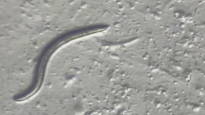A small group of worms was found in the Siberian permafrost excavated at a depth of 40 meters.
A group of researchers from three German biological research institutes has succeeded in reviving worms that have been in a hibernation-like state where metabolism stops, i.e. cryptobiosis, for 46,000 years.
The worms were originally unearthed by a group of Russian researchers in 2018 from the Siberian permafrost at a depth of 40 meters.
– The most important discovery was actually that we were able to identify a new species. We did not find a genetic sequence anywhere that would be the same as the worms we found, so it is a new species, says Dr. Philip Schiffer from the University of Cologne for the news agency Reuters.
The scientific name of the new species is panagrolaimus kolymaensis.
– This little worm is on its way to the Guinness Book of Records after being in hibernation for much longer than anyone could have believed possible, says another member of the research team Teymuras Kurzchalia.
The worms were revived by giving them food and water. They survived for a month after this, but 100 generations of new worms have multiplied from them.
– Worms seem to have succeeded in developing a molecular toolkit for survival, says Schiffer.
The researchers have concluded from the worms that mild dehydration before freezing helped them prepare for cryptobiosis and ultimately survive – at 80 degrees.
According to Schiffer, the research will benefit the understanding of the survival of species as the climate changes.
– We learn things that are useful in saving species threatened with extinction.
Reuters
